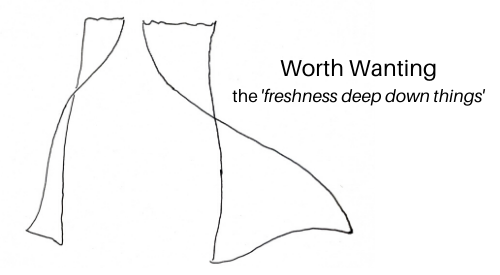
I mean, if we encounter by making common cause with the livingness of another addressed as you, who or what is you?
It’s the word used for 2nd-person interactions with one or several others. In English, it’s used in formal address as well as informal, and with either males or females or both.
We use it when we engage in exasperated personification even with objects (“Why won’t you stay there?”) or with ourselves (‘You’ve done it again, Peter!”), but not usually seriously.
Second person interactions are in contrast to first person/third person pairs: I vs him, her or it, or we vs them, or combinations, or inversions of the same; in contrast also to internal soliloquies.
What characterizes 2nd-person you interactions is the recognition of an other as not oneself and not incapable of listening and replying. When someone or something is addressed as you, it’s as if it has an independent, inner life, a capacity for receiving, processing and responding, an interiority such as we have.
The key thing about 2nd-person interactions is that they make a claim of answerability on us. Honor or dispute it, we feel the call to reply. This is the basis of mutuality, of reciprocity, of community.
So the word you refers to a presence that obliges us, not necessarily to explain or justify or give account, but at least to respond, to answer, to reply.
The presence of a you-presence is not only is an occasion of change, but often of a change not just in our ways but in our whys of changing. An analogy: our habitual activities often involve changes in position (adjustments to the steering wheel, say), and our actions may involve changes in some activity (pulling back into lane when another car appears on our left, for instance), and our priorities and aspirations may involve changes in some action (turning off at this exit or another).
A you-presence often occasions these deep changes because any 2nd person interaction has the potential of getting us to consult our inner selves, our suitoria, for the reply we want to make. The presence of a you-presence puts questions to us that we cannot not respond to. Even ducking them is a response.
In an encounter we make common cause with the livingness of some other addressed as you, but there may not be formal use of the pronoun, but simply a recognition of the claim of answerability.
So, for instance, an event like a serious accident we once had can, over time, raise questions for us–what did I learn, what did it mean–that can provoke repeated internal reflection and profound changes in priorities, much as a 2nd person interaction can.
Reflection can make any experience, not just the dramatic ones, into a you-presence, which can result in the reordering or restructuring of our inner selves, which is manifested at the border or frontier between our suitoria and our alitoria, the outer world of others and othernesses.
That threshhold or liminal zone, considered as a whole, is like a visage, expressing in its shape, movements, textures, colors, excreta and so on not just the current stance of the inner self, but a summation of all prior experiences.
Our livingness is the dynamism of this shoreline or littoral, measured in terms of more or less responsiveness to others or othernesses, and especially to their livingnesses.
Transcendent freshness is the lover of livingness, all livingness, and especially ours when we, I and another addressed formally or not as you, make common cause with the livingness of each other.
Freshness invites us to encounter and fills the encounter space, and invests the encounter with a fresh future forever.
Through freshness in encounters, we respond to the other in ways that change our patterns of change, immediately or on reflection, and thus that visage which expresses the contours, composition and internal configuration of our inner selves that we present to the other–and the other to us.
My livingness and that of the other, wholly expressing who we are at that moment and up to that moment, partake of the lastingness of the encounter as a whole, and, encounter by encounter, contribute to the visage of the consummation which freshness is bringing into being.
Freshness, other yet lover, is the first you, and all around us (and sometimes latent within us) are a multiplicity of you-others waiting to be encountered.
What is you?
That which gets us to answer.
